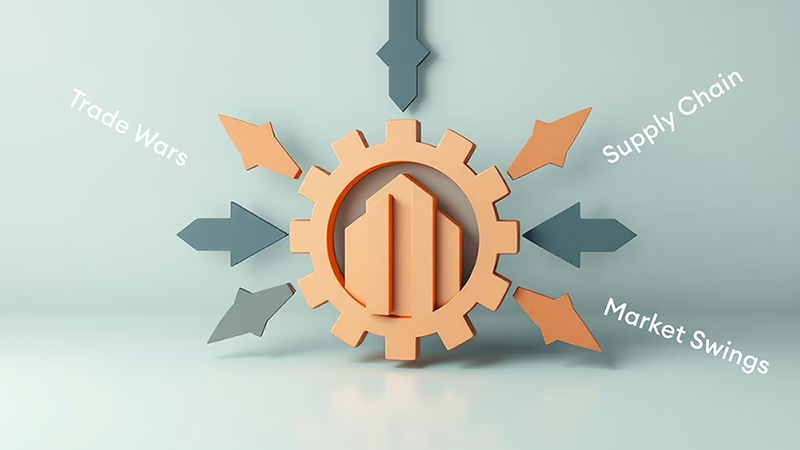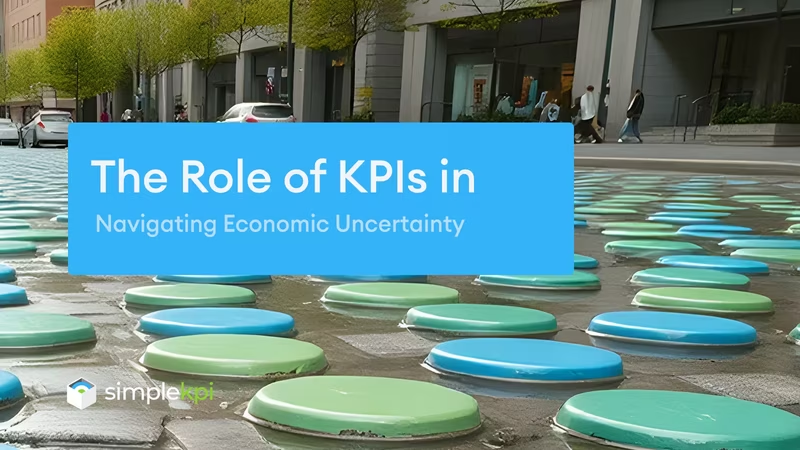Change is the only thing we can count on.
It seems that economic ups and downs, either caused by global events, internal issues or technology such as AI, are now an inevitable part of running a business.
Subsequently it's getting harder for companies of all sizes and industries to deal with economic uncertainty, but it's possible.
With a bit of planning and a KPI strategy, you can at least put yourself in the best position to ride these highs and lows.
If you’re new to KPIs, then they are key indicators that show how well a business is performing and how aligned they are to their goals.
And in the current climate they're even more important when trying to not just survive but to grow. McKinsey & Company found that businesses that watch their financial and operational KPIs are more likely to do better than their rivals during uncertain times.
When used well, KPIs give you the insights you need to make smart choices, improve performance, and adjust to changing markets.
So why is Economic Uncertainty a Problem for Businesses?
Currently, economic uncertainty is coming from many directions. This includes inflation, supply chain issues, market swings, and unexpected global events like conflicts and trade wars. The IMFexpects global economic growth to slow down in 2024 and 2025, down from 3.4% in 2022 because of a combination of these factors.

When the economy is unpredictable, businesses face several problems:
- People lose confidence: Customers naturally spend less, which lowers sales, income and profit margins.
- Cash flow is unstable: It gets harder to predict and manage cash flow, which hurts not just operations but investment in necessary areas such as marketing and updating machinery.
- The market is unpredictable: Changes in supply, demand, and prices often lead to higher costs and lower profits.
As a result, it’s all too common to see businesses without a clear plan get stuck in survival mode, simply reacting to problems instead of proactively handling them. That's where KPIs come in.
Why KPIs Matter During Economic Uncertainty
When things are so uncertain, KPIs are a reassuring look at your real performance, free from bias and opinion. They help you keep focused on what's especially important, (even when seeing those external factors threatening to throw your business off course) they provide:
Real-Time Insights
Things can change in the blink of an eye. You need to know how this is affecting your business and quickly spot areas that need attention. When tracked regularly, KPIs let you quickly see such things as negative trends, falling sales, rising costs, or changing customer behavior.
For example, keeping an eye on Customer Retention Rate is very important during uncertain times. Bain & Company's research shows that boosting customer retention by just 5% can raise profits by 25% to 95%. If your retention rate starts to drop, it means you should act fast. Maybe by introducing loyalty programs, improve customer support, or changing your pricing.
They Help You Make Decisions Quickly
Being able to adapt quickly is key to surviving these economic uncertainties. KPIs help with agile decision-making by giving you the data you need to make any important decisions based on data.
If you take a KPI like Inventory Turnover Ratio for example, it shows you that product sales are slowing, then you might decide to order less new inventory. A Harvard Business Review study found that companies that react quickly and adjust their inventory management see 35% better financial performance during economic uncertainty. Without this real-time data, you could risk overstocking, which leads to higher costs and less much needed cash.
They Promote Accountability
When it comes to employees, all your staff need to know how they contribute to the company's goals. KPIs help break down the strategic goals you’ve set them into smaller, trackable targets or actions. And by giving specific KPIs to your employees, you can make sure everyone is accountable. A Salesforcereport says that teams with clear KPIs see a 30% boost in productivity.
They Support Risk Management
One of the main (yet undervalued) bonuses KPIs do during economic uncertainty is to help manage risk. KPIs help you spot vulnerable areas, so you are able to fix problems before they become major issues. PwCreports that 60% of CFOs think managing cash flow is crucial during economic ups and downs. Watching KPIs like Operating Cash Flow closely can show if a company has enough cash to cover its expenses.
They Help Optimize Cost Management
Economic uncertainty often forces businesses to make tough choices about managing costs. KPIs provide clarity by showing which parts of the business are doing well and which are struggling. This helps companies make better decisions about where to cut costs and where to invest. Deloitte says that businesses that optimize cost management can cut expenses by up to 20% without hurting performance.
Key KPIs to Track During Economic Uncertainty
While KPIs can be different based on what business you run, some indicators are especially useful during these uncertain times:
- Cash Flow KPIs: Metrics like Operating Cash Flow, Free Cash Flow, and Cash Conversion Cycle help you maintain enough cash during tough times. Ernst & Young found that companies with good cash flow management are 30% more likely to survive economic downturns.
- Customer-Focused KPIs: KPIs like Customer Acquisition Cost (CAC), Customer Lifetime Value (CLV), and Customer Satisfaction help you keep revenue steady through customer retention. Gartner says that 86% of customers will pay more for a better experience.
- Cost Management KPIs: Metrics like Cost of Goods Sold (COGS) and Gross Profit Margin show where your inefficiencies and rising costs come from. Deloitte says that effective cost management can save up to 20% in expenses without cutting output.
- Revenue Growth KPIs: Metrics like Monthly Recurring Revenue (MRR), Sales Growth, and Net Profit show sales performance trends. McKinsey & Companynotes that companies using financial KPIs are 50% more likely to outperform competitors.
- Employee Productivity KPIs: Metrics like Revenue Per Employee and Employee Engagement help keep your employees productive and happy. A Gallup reportsays that highly engaged teams are 21% more profitable.
How to Use KPIs for Long-Term Success
Dealing with economic uncertainty is about more than just surviving; it's about getting into a pattern of tracking KPIs that set you up for the good times also. By clearly setting your KPIs, you can stay focused on your goals while being able to adapt to changes.
To get the most from KPIs during uncertain times, think about these steps:
- Choose the Right KPIs: Make sure you're tracking the KPIs that best fit your current goals.
- Set Realistic Targets: Economic uncertainty might mean you need to change your KPI targets to reflect what's happening in the market.
- Check Performance Regularly: Use a KPI dashboard to watch KPIs in real-time and adjust your strategy as needed.
- Communicate with Your Team: Make sure everyone understands the KPIs they're responsible for and how their work affects the company's overall success.
In Conclusion
Putting you’re head in the sand during economic uncertainty is an excellent strategy to set you up for failure, but you can handle these times more confidently and effectively with the right tools. Your KPIs will provide clarity, focus, and insights, which will allow you to make smart decisions, stay agile, and reduce risks.
And by using a good KPI tracking system, businesses can not only survive economic uncertainty but also set themselves up for long-term success. Using KPIs will help you stay ahead, adapt to market changes, and keep improving performance no matter what challenges come your way.

by Stuart Kinsey
Stuart Kinsey writes on Key Performance Indicators, Dashboards, Marketing, and Business Strategy. He is a co-founder of SimpleKPI and has worked in creative and analytical services for over 25 years. He believes embracing KPIs and visualizing performance is essential for any organization to thrive and grow.
